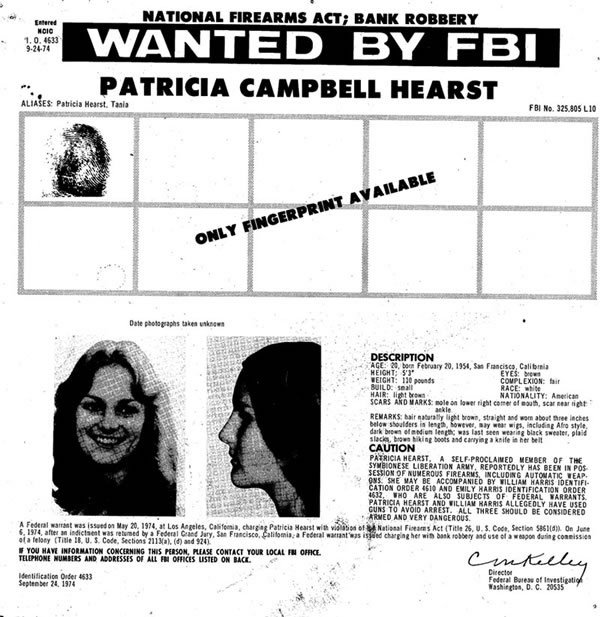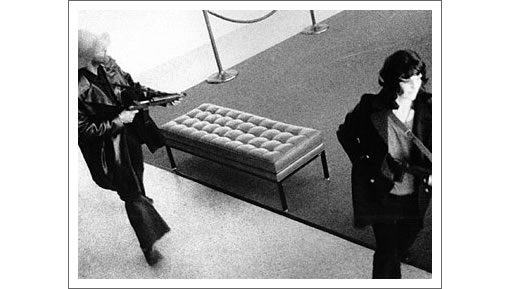Tim White's beads
Actors and audience
Linked to Performance and Identity formation
1.1 Patty Hearst
The kidnap of Patty Hearst in 1974 highlighted the narrow conduit through which identity might be offered up. Hearst, grand-daughter of William Randolph Heart, the inspiration for Citizen Kane, was 19 when taken by the Symbionese Liberation Army. Two months after her kidnap the SLA released a tape of the young heiress, denouncing her previous life and values. Shortly afterwards, Hearst was captured on surveillance camera participating in a bank raid


Her involvement led to her being placed on the FBI wanted list and the issuing of the following poster. The disparity between the gun-toting criminal and the beaming young heiress shown on the poster fuelled public interest akin to that more recently seen with the OJ Simpson trial. Central to the discussion was the notion of who this woman was – Patty Hearst, brainwashed and exhibiting what had been diagnosed the previous year as Stockholm Syndrome or Tania, a committed member of the SLA prepared to break the law in pursuit of its aims. Evidence supporting both propositions emerged before Hearst’s arrest in 1975 and during and after the trial, with the notoriety of the case continually reasserting itself with repeated requests for pardons from Hearst to successive US Presidents. Claim and counter-claim were aired in a flurry of books by Hearst and others involved in a battle for attention that seemed to regard the legal process as a distraction, with Hearst’s defence lawyer taking the case on the condition that he get the book rights and that Hearst could not issue her memoirs for 18 months following his publication. The lawyer, F. Lee Bailey was later to represent OJ Simpson, the basketball star and latterly film actor (as Hearst was to become, albeit with limited success) in an attempted murder case that in its courting of the media had many parallels with the Hearst case. In both instances the public were invited to distinguish between competing media representations of individuals. Hearst had a seven year sentence commuted after 22 months by Jimmy Carter yet did not receive a presidential pardon until 2001. In the interim she assumed the identity of various characters in film and television work.
1.2 The King of Comedy (Martin Scorsese) 1982
From the gangster-themed bookends of 1973's Mean Streets to Goodfellas in 1990, Martin Scorsese directed a string of critically and commercially successful films that established him as one of the contingent of 1970s movie brats (including Coppola, Lucas and Spielberg). The King of Comedy marked a clear departure from the successes of this period, replacing flawed but captivating protagonists with the eminently forgettable Rupert Pupkin, played by Robert de Niro, as the self-proclaimed King of Comedy. In place of the claret spattered finale administered by vigilante Travis Bickle in Taxi Driver or the sweat-drenched beating endured by Jake la Motta in Raging Bull, the kidnapping and subsequent death threats perpetrated by Pupkin are so mild as to warrant no more than a PG (parental guidance) rating. Yet the growing acclaim for this film arises from its refusal to glamorise, to rise above the commonplace. It proposes a moral universe in which the acquisition of fame trumps the liberty of the individual and dispenses with the vagaries of fate and the notion that talent should distinguish one person from another. In short, Pupkin, seeking to emulate his idol, chat show host Jerry Langford, endures a continuing series of rebuffs and slights culminating in him kidnapping Langford and promising his safe return on condition that he, Pupkin, be allowed to deliver a monologue on Langford's wildly popular TV show. Pupkin achieves his objective, is subsequently arrested and, after a period in prison, returns to capitalise on his notoriety by means of an autobiography and his own chat shot. Crime clearly does pay handsomely in this instance though we are left puzzled at what real benefit Pupkin hopes to acquire from his actions - Langford is shown to live alone, hounded by his fans and denied the freedom to enjoy the opportunities his fame allows. Pupkin, as co-star Sandra Bernhard later acknowledges, is a figure that, along with Warhol's famous dictum "In the future, everyone will be world-famous for 15 minutes." presages the rise of celebrity culture and reality television and their growing interdependency.
Tellingly, the final section of the film
not only shows the collusion of the media in creating a star out of Pupkin but the introduction to his stage performance seems not to precede some display of his talent but a repeated acknowledgement of his name, the previously mispronounced Pupkin - Pumpkin, Pitkin, - reiterated as if the name itself could stand alone, not requiring the individual to advance any reason for his elevation.
1.3 The Bonfire of the Vanities
Tom Wolfe's Bonfire of the Vanities charts the decline of a New York WASP bond trader in a novel that detects cynicism across the social spectrum. The hit and run incident of the trader, that may have been responsible for a black youth's death is seized upon by an ambitious District Attorney seeing it as the means to secure re-election, a newspaper hack whose liberal interpretation of events seem to promise journalistic reknown and a religious and political leader from Harlem who wastes no opportunity to exploit the potential racial and social divisions the accident generates. In the excerpt provided, the logistics of protest are exposed as being in thrall to the requirements of the media. The central characters referenced are Fallow the journalist, Baconthe religious leader, Mrs Lamb mother of the young boy who was killed and Corso the TV news reporter.
This small vignette is by no means the central focus of Wolfe's novel but implicates the messenger in the news that they convey and also implying that beyond the pro-filmic - that which happens in front of the camera - there is nothing. There are obvious antecedents, notably Thích Quảng Đức's self-immolation (1963) in protest at the persecution of Buddhists that was preceded by a tip-off to reporters that "something important" would happen and subsequently captured in Malcolm Browne's Pulitzer winning photographs. In a contemporary environment the stage-managing of events, photo-opportunities and the packacking of occurences into media events, brought to a rolling boil in breaking news that actuates a sense of the present in the domestic sphere as events of great import are strung out with endlessly scrolling updates at the bottom of the screen. Leaving aside the consequences of this upon the audience, the final bead illustrates how this expectation might transform who the actors are and how they might behave.
1.4 President Reagan 11/8/84
On 11th August 1984, in a sound check prior to his weekly Saturday radio address, President reagan made the following off-the-cuff remark to the sound technicians.
Though the speech did not go out live (unlike the unguarded remarks of Gordon Brown whose final days in office were not improved by his broadcast despair - http://news.bbc.co.uk/1/hi/uk_politics/election_2010/8649012.stm) it resulted in the Soviet Far East Army being placed on alert and a strong rebuke from the Soviets. In joking about the then very real tension that existed between the world's two superpowers, Reagan revelaed not only some doubt as to the seriousness with which he took his position, as if this was something that could be turned on in synchronisation with the 'on air' light but also a consummate ease with his role, his incendiary remarks being a variant of the actual speech he subsequently delivered live: "My fellow Americans, I'm pleased to tell you that today I signed legislation that will allow student religious groups to begin enjoying a right they've too long been denied — the freedom to meet in public high schools during nonschool hours, just as other student groups are allowed to do" Reagan's previous employment as a film actor of some standing enabled him to perform the role of President with a practised gravitas yet also imbue it with the considered humuor of the chat-show raconteur. The qualities that he evinced as a performer - Gore Vidal always referred to him as the acting president - became increasingly those his successors would be judged by. This expectation is conveyed in the title of Rafferty and Ridgeway's documentary covering the 1991 New Hampshire primaries that conveys the voraciousness of the camera waiting to gouge on every utterance of the hapless candidates, whether conscious or it's gaze or not. Pointedly Roger Ebert's review reflects a concern with presentation over content:
reflects a concern with presentation over content:
"Of all the candidates in both parties, Bill Clinton comes over the best in "Feed." He seems more cool, more self-confident, more relaxed."
